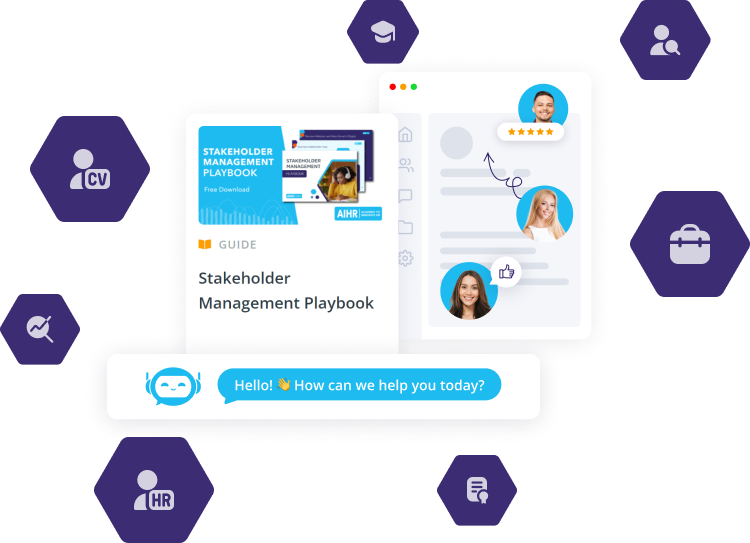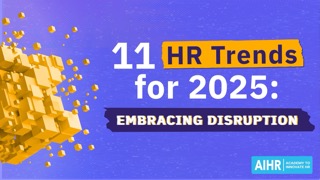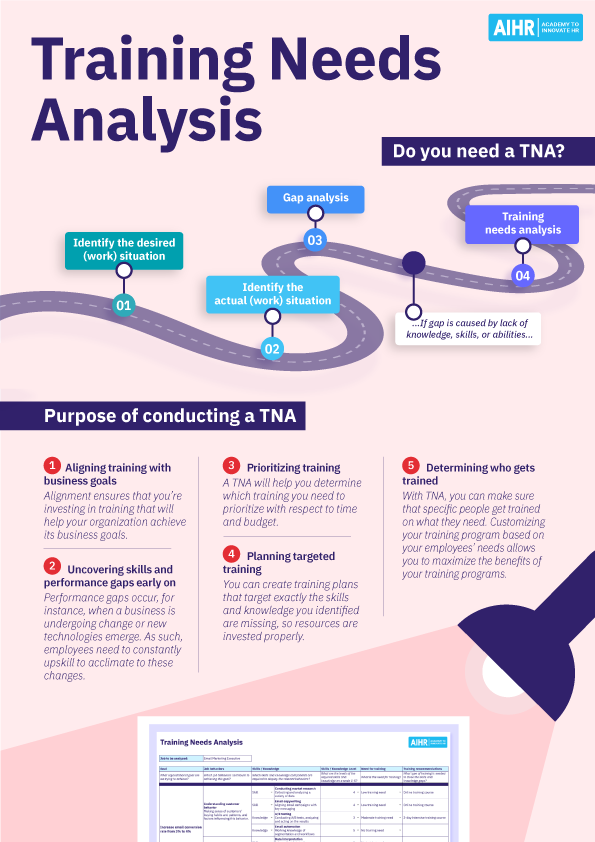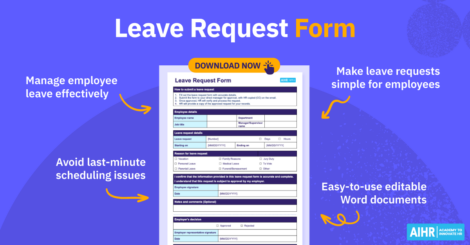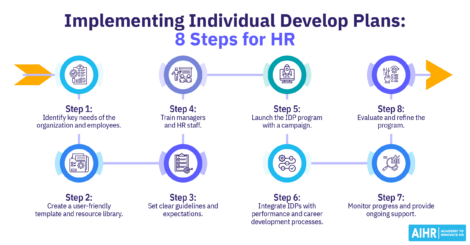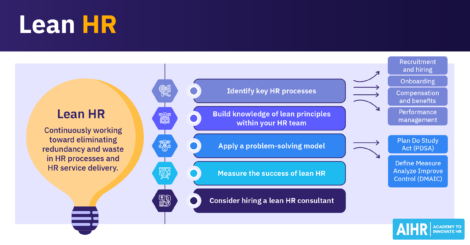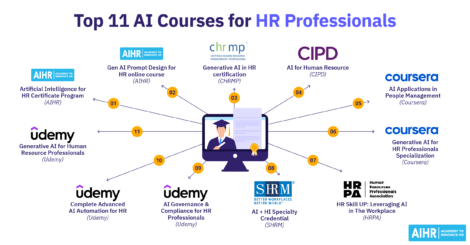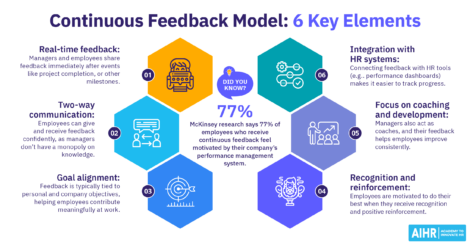A Guide to Conducting a Training Needs Analysis [Free Template]
Want to improve employee efficiency and performance? Conducting a comprehensive training needs analysis might be your answer.
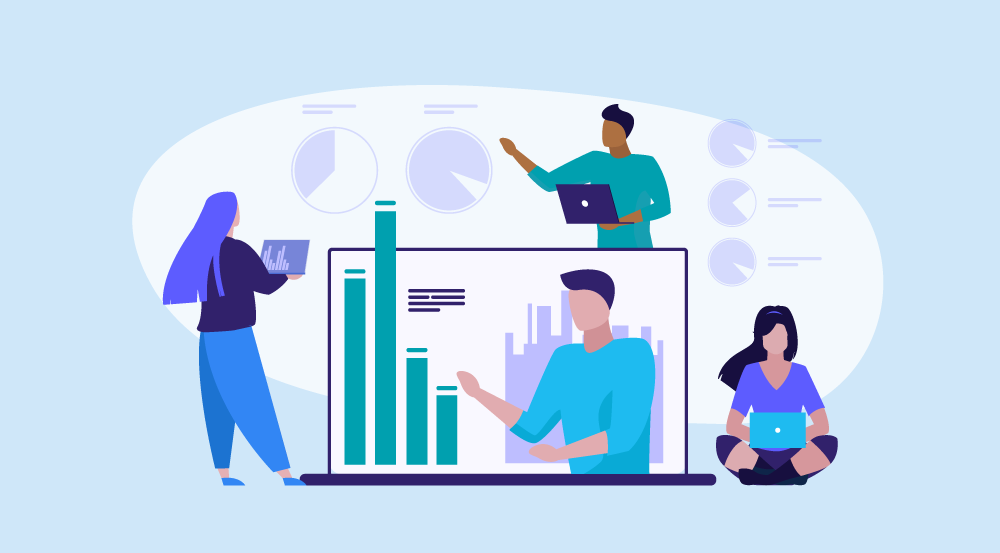
Training needs analysis is a key tool in the arsenal of any L&D professional, trainer, or training consultant. It’s effective in determining learning and development areas you need to focus on to address performance gaps that get in the way of achieving organizational goals. In this article, we will explain what a training needs analysis is, provide a guide for conducting this analysis, and helpful examples.
Let’s dive in!
Contents
What is a training needs analysis?
What is the purpose of conducting a training needs analysis?
Training needs analysis best practices
How to conduct a training needs analysis
Training needs analysis examples
Training needs analysis template [Free download]
Training needs analysis questions
FAQ
What is a training needs analysis?
Training needs analysis (TNA) is a process to identify the gap between the actual and the desired knowledge, skills, and abilities (KSAs) in a job.
The need for such analysis usually arises due to an organizational problem. It can be a lower-than-expected quarter for the sales team, changing technology threatening to impact the continuity of train operators, or constantly low customer satisfaction scores forcing the product team to be more agile and customer-focused. In all these instances, the problems can potentially be resolved through training.
In other words, when a lack of knowledge, skills, or abilities causes the problem, conducting a training needs analysis and subsequent training can be a viable solution.
Conversely, training needs analysis won’t be effective if it’s broader organizational issues that cause the problems. This may mean that instead of a lack of knowledge, skills, or abilities, our diagnosis may point out that sales are low because of a mismatch between the work and the rewards. Or that customer satisfaction is low because the top-down driven product strategy is not in line with what customers are looking for.
These problems cannot be solved through training (alone) but require organizational interventions.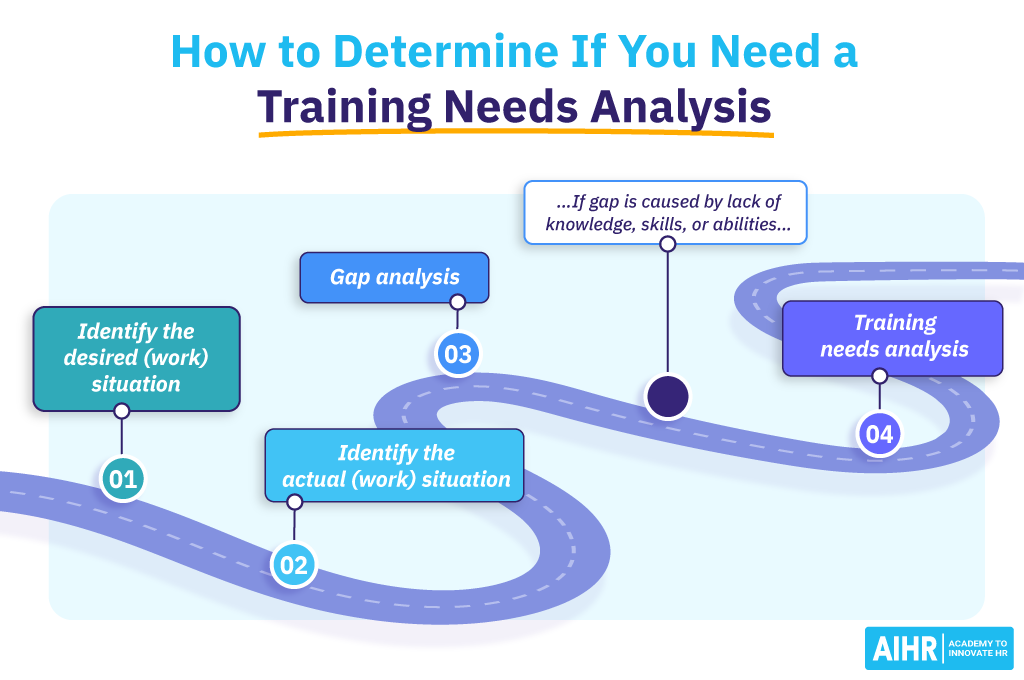
An example we’ve run into is assertiveness training that a large county hospital was looking to purchase from a respected vendor. The problems were increased harassment incidents and medical errors caused by nurses not speaking up. The organization was looking to train these nurses on assertiveness.
During the intake, the trainer realized that the organizational culture was highly hierarchical and that it was common for people who did speak up to be fired or otherwise punished. The trainer refused to participate, explaining that the hospital first had to work on a culture where it was safe to speak up before training its staff. Doing it the other way around could have devastating consequences for the nurses.
Knowledge, Skills, and Abilities
KSA refer to the knowledge, skills, and abilities that an employee must have to perform their responsibilities within their roles. They’re listed in the job description and guide candidates and employers to assess the person’s chance to succeed.
KnowledgeTopics and subjects that can be used when performing work functions when the person is hired.
Examples:
- Knowledge of accounting principles and practices
- Knowledge of budget control policies and procedures
SkillsTechnical or manual proficiencies are usually gained or learned through training. They are observable and measurable.
Examples:
- Skills in analysis and problem-solving
- Skills in using Microsoft Excel and accounting software
AbilitiesCapacity to apply knowledge and skills to perform a task. It also includes personal and social traits which are innate or acquired without formal training.
Examples:
- Ability to process large amounts of numerical data
- Ability to prioritize work and meet deadlines
Training needs analysis levels
There are three levels of training needs analysis based on your organization’s goals and the knowledge and skills required for goals at each level:
- Organizational level TNA – It determines training needs related to performance metrics, new employee knowledge at the company-wide level, and continuous training to optimize company performance and productivity to achieve its goals. It’s designed to address problems and weaknesses of the organization as well as to further improve the company’s current competencies and strengths. More importantly, it takes into account other factors like trends and changes in the economy, politics, technology, and demographics.
- Group/job role level TNA – This type of analysis identifies specific training needed to upskill a team, department, or business unit. Moreover, it determines which occupational groups experience skills gaps or discrepancies and ways to eliminate them.
- Individual level TNA – This training needs assessment is dedicated to an individual or individuals in a team. It is conducted in conjunction with a project or changes that could impact each team member. It is also used for an employee’s personal development for future career advancement.
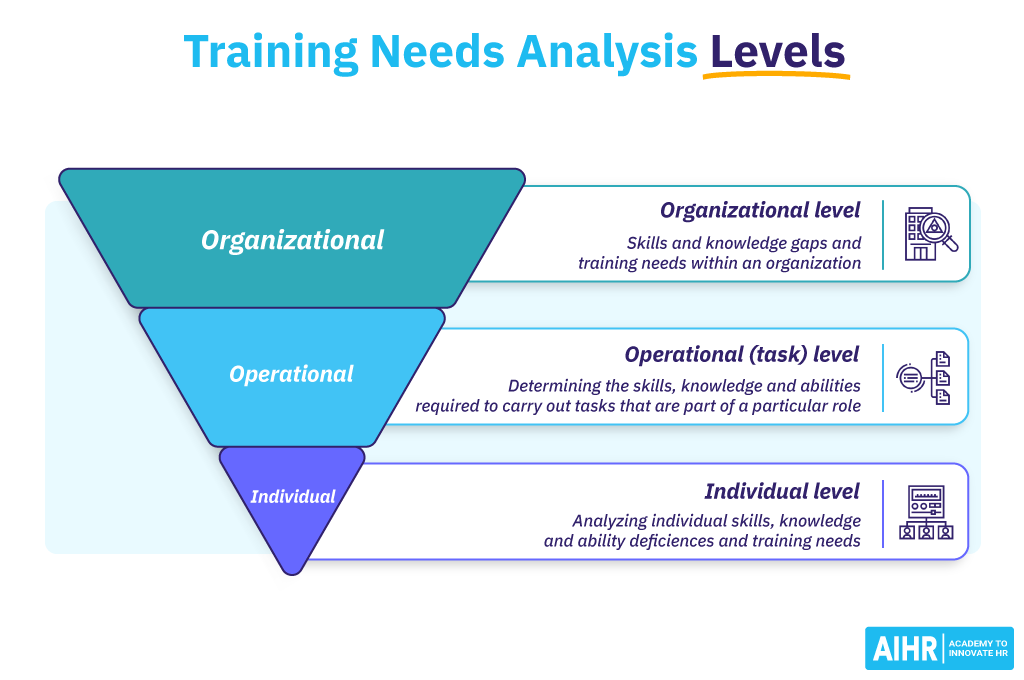
What is the purpose of conducting a training needs analysis?
The purpose of training needs analysis is to identify and bridge the knowledge and skills gaps in the workforce to achieve optimal performance. TNA also uncovers the reasons for the gaps and helps determine the different approaches to removing those gaps.
Moreover, training needs analysis helps in:
- Aligning training with business goals – Alignment ensures that you’re investing in training that will help your organization achieve its business goals. Identifying the short and long-term objectives for your organization and the skills needed to achieve them helps L&D professionals to focus on the scope of the training.
- Uncovering skills and performance gaps early on – Performance gaps occur, for instance, when a business is undergoing change or new technologies emerge. As such, employees need to constantly upskill to acclimate to these changes. TNA allows organizations to resolve these gaps before they become a major issue. However, a study by PWC pointed out that only 40% of employers are upskilling their workers to address skills and labor shortages.
- Prioritizing training – A TNA will help you determine which training you need to prioritize with respect to time and budget. “Training needs analysis is critical if you want to ensure you don’t waste resources, time, and energy,” notes Emily Chipman, executive coach and principal consultant at Rushman Consulting Solutions. “When done correctly, people learn more quickly, there is a greater impact on job performance, and it reduces the frustration that comes for employees when taking on new roles and tasks, thereby impacting employee engagement.”
- Planning targeted training – You can create training plans that target exactly the skills and knowledge you identified are missing, so resources are invested properly.
- Determining who gets trained – With TNA, you can make sure that specific people get trained on what they need. Customizing your training program based on your employees’ needs allows you to maximize the benefits of your training programs.
Training needs analysis doesn’t only benefit the organization, but also positively impacts employee experience. Karolina Kijowska, Head of People & Culture at technology startup PhotoAiD, explains that they conduct training needs analysis not only when a problem arises.
“We also go for it when employees ask for more growth opportunities because we want to offer them the best-tailored training. L&D programs based on training needs analysis helped our organization raise eNPS scores from 57 to 65 points. That’s because we provide employees with the training opportunities they asked for,” Kijowska points out.
Training needs analysis best practices
Here are three best practices we recommend applying when conducting a training needs analysis:
- Start with the desired outcome. Identify which activities lead to these organizational outcomes before identifying training activities. This outcome can be an organizational or departmental goal. Or it could be an individual that needs improving.
- Manage expectations. Training and training need analysis requires advanced stakeholder management. Stakeholders include employees, service users (or customers), educational providers who design and deliver the program, and internal sponsors who pay for the educational event. Ensuring that the training satisfies all groups is crucial for its success. In other words, when a manager thinks a communication training session will solve all their internal problems, you need to manage their expectations.
- Use an integrated approach. Research shows that training programs that place new skills in a broader job or organizational perspective and integrate them with other organizational processes and activities are more successful. This does not mean that you cannot focus your training on something specific, but you must place what people learn into an organizational perspective.
Next, let’s have a look at how to conduct a training needs analysis.
How to conduct a training needs analysis
When conducting a training needs analysis, it is good practice to follow a standardized process.
We will go through each of the training needs analysis process steps using an example, explain the different elements to account for, and define what is needed to move forward to the next step. In our example, we will assume that a training solution can fulfill an organizational need.
Step 1. Defining organizational goals
As described earlier, a training needs analysis is always initiated by an organizational symptom or pain point. Filip Moriau calls this ‘organizational stress’ in the context of future skills in the video below.
Usually, a (senior) management comes to the L&D team with one of these symptoms and asks them how they can help to fix it. These problems can include:
- an organization losing its innovative lead
- a sales department struggling to increase market share for a fast-growing scale-up
- the board has come up with an organizational capability that every employee must develop.
The pain points often also relate to new opportunities that an organization wants to get ready for. According to Veena KV, Head of People Ops at FirstPriciples, some examples are:
- Introducing new technology or processes that employees need to be trained on
- Trying to improve compliance or safety within the workplace
- Wanting to develop the skills of the organization’s workforce to prepare for future business opportunities or to stay competitive in the job market
All these challenges relate to organizational goals. If this is not the case, the challenges are usually not worth fixing. The manager is unlikely to approach L&D for a training solution. If the organizational goal is unclear, take your time to explore it. Exploring it will help you diagnose the problem and training needs.
When we talk about organizational goals or outcomes, we focus on measurements like:
- Financial performance
- Revenue
- Profit
- Return on Equity
- Return on Capital Employed
- Earning growth
- Share price
Softer outcomes can include customer satisfaction, customer loyalty, and organizational culture.
Organizational goals and outcomes are hard to influence as the entire organization contributes to them. They are subject to influences outside employee behavior, so it’s hard to improve them through training.
The best approach is to break the organizational goal down into a department or individual goal (we will do this later in this article), or focus on core competencies.
Core competencies are competencies that all employees in the organization must have. Most organizations have defined and specified what good performance on these competencies looks like. Everyone in the organization should have a basic skill level in these competencies. There is consensus on these core capabilities, so it is easy to define their relevant job behaviors (step 2).
Before going to the next step, the L&D professional should examine if this organizational goal is attainable through appropriate job behaviors alone (step 2). Non-behavioral influences can also impact these goals, which should be addressed in tandem with the learning solution.
The training needs analysis process is highly similar for individual cases. Instead of an organizational goal, an individual or departmental goal is listed. The individual goal should be directly related to a departmental or organizational goal to ensure the maximum impact.
Step 2. Define relevant job behaviors
Let’s say we are an L&D professional working for a large consulting company. Currently, a small group of partners sells large-scale projects to clients. However, in the future, all consultants will be required to sell their services to (potential) clients. In other words, this will be a new core competency that everyone in the organization needs to develop.
The next step is defining the appropriate job behaviors that will build this competency to help achieve the organizational goal.
For consultants to sell their services, they need to build relationships, spot and explore opportunities, provide solutions, and seal the deal commercially. If we were to define these behaviors, they would look like the following.Behaviors Description Build relationships Able to effectively build and maintain relationships with a wide range of potential clients; staying top of mind. Spot opportunities Able to spot and effectively scope opportunities when they arise. Turn opportunity into a deal Specify how they can solve their problem through expertise and close the deal.
The following step is breaking down these high-over behaviors into the skills and knowledge required to show this behavior effectively.
When it comes to an individual job, you can conduct job analysis to analyze job behaviors. The most-used approach here is the task inventory. For example, a receptionist has many duties, including a hospitality duty. The tasks for this duty can be defined as follows.
Hospitality duty for a receptionistTasks Frequency Importance Difficulty Answering the intercom when the doorbell rings 300/day Medium Low Welcoming guests and guiding them to the waiting room 120/day Medium Low Providing guests with a drink 80/day Low Low Answering questions from visitors 30/day High Medium Managing expectations about waiting times 30/day Medium High Receiving and handling complaints 6/day High Very high
The receptionist may have other duties as well, leading to a long overview of different duties with their related tasks. Based on these tasks, the job analyst or L&D professional can score the task’s frequency, importance, and difficulty. They collect this information by looking at the job description and talking to the manager and employees. This job analysis provides input for steps 2 and 3 of the process.
Step 3. Define the required knowledge & skills
The relationship-building and commercial behaviors we have defined earlier need to be specified before we can move on to a training program. The more specific we can make these behaviors, the easier it will be to create training programs that fulfill these behavioral dimensions.Behaviors Description Build relationships & spot opportunities Required Skills
S1. Actively reach out to create networking opportunities
S2. Establish rapport by finding common ground
S3. Adjust approach to accommodate variance in clients’ characteristics, needs, goals, and objectives
S4. Ask client about a preferred method to communicate (e.g., email, phone, WhatsApp, WeChat)
S5. Staying top-of-mind and regularly checking for new opportunities.
S6. Validate assumptions about client’s financial status and purchasing readiness
S7. Leverage information related to client’s decision-making process, organization structure, and profile of all individuals involved in the purchasing decision
S8. Establish a follow-up communication schedule
S9. Maintain relationships with key decision-makers and influencers
Required knowledge
K1. Client relationship management system/database
K2. Client’s social style (e.g., analytical, driver, expressive, amiable)
K3. Emotional intelligence
K4. Importance of customer experience to build loyalty
K5. Question techniques and how to use them to extract client needs and build opportunities
K6. Sales conversation techniquesTurn opportunity into a deal Required skills
S1. Identify buying signals
S2. Sell using subject matter expertise
S3. Ask the client for its business
S4. Conduct process and identify areas to improve in future opportunities
S5. Clarify objections to understand a root cause
S6. Develop a timeline
S7. Achieve consensus versus settling
S8. Involve experienced seniors in closing complex deals
Required knowledge
K1. Closing techniques (e.g., assume close, close on minor points, overcome objection as a barrier to sale, offer an incentive to close, use last chance, ask for business directly)
K2. Difference between closing with sale vs. securing the next steps in the sales process
K3. Objection handling or resolution processes
K4. Negotiation techniques
K5. Influencing tactics
As you can see, we have combined three behaviors into two behavioral groups and defined the required skills and knowledge for each. We used a competency framework by the Canadian Professional Sales Association for the basic skills and knowledge elements and adapted them to consultative sales.
To complete this framework, ask employees who already have these skills. Go back to the assignment-giver to check if these behaviors, skills, and knowledge will help achieve the organization’s goals. The employees can say to what degree the knowledge and skills accurately reflect the core competencies the organization needs.
The last step is to assess the current skills in the organization. Not everyone will need the same training. For example, the partners in the consulting firm already have extensive sales experience – they will not benefit from this training. A senior staff member will require different training than an associate or a junior. All these details must be considered before moving to the next stage.
For individual jobs, you can define the required knowledge & skills. This can be based on the task inventory and supplemented by other information sources.
Training needs analysis techniques
You can apply different training needs analysis techniques to map the required and available skills. Some common techniques include:
- Observations: Directly watching employees perform their duties to identify skills they possess, as well as gaps and areas for improvement.
- Questionnaires: Distributing structured surveys to employees to gather insights about their skills, perceived training needs and areas of interest.
- Interviews: Conducting one-on-one or group discussions with employees to explore their training needs, challenges, and suggestions for development opportunities.
- Assessments: Utilizing tests or simulations to evaluate employees’ current skill levels and identify specific areas where training is needed.
- Skills audits and skills inventories: Conducting comprehensive reviews of the skills and qualifications currently available within the organization to identify strengths, gaps, and areas for development, and inventorizing the data.
- Employee development plans: Identifying groups of employees with similar KSA.
- HRIS data mining and text mining CVs: Applying data and text mining techniques to HRIS data, resumes and CVs to uncover patterns, trends, and gaps in the workforce’s skills and qualifications.
- Text mining of job descriptions or job vacancy texts: Determining required competency levels per function.
- Job analysis: Breaking down jobs into their component tasks and determining the necessary skills and knowledge for each task.
Step 4. Develop training
The final step in the process is the training design. Here, you’ll communicate the needed learning outcomes you defined in step 3 to the training provider(s). You also determine a budget, scope the time investment of the training, and decide if you will work with internal or external trainers.
Remember to consider non-training alternatives that can help develop the required knowledge and skills. It can be the inclusion of these core competencies in the performance management review and praising and rewarding the defined behavior. Or you can also add them as selection criteria in the hiring process. All these interventions will help build and reinforce the knowledge and skills.
The training phase is where you can apply the ADDIE model. The ADDIE model is arguably the best-known model of training design. ADDIE is an acronym for Analyze, Design, Develop, Implement, and Evaluate. Good training design involves going through all five stages.
The first stage, Analyze, is where the training needs analysis comes in. In this phase, you:
- Define instructional goals and their alignment with organizational goals
- Determine the target audience
- Recognize behavioral outcomes, and
- Identify learning constraints.
All these elements are addressed in the training needs analysis process you learned about in this article.
In the following stages, your team designs, develops, and implements learning programs. Finally, you evaluate their effectiveness. All these stages are much easier to do well once you complete the training needs analysis in a thorough manner.
Terry Traut, CEO at leadership development company Entelechy, highlights that at every step, it’s important to stay focused on how to improve performance regardless of whether the ideal solution ultimately requires training.
“We may find that skills and knowledge are not the issue – or not the only issue. To increase performance, perhaps a simple job aid is required; sometimes it’s as simple as telling people what’s required; other times perhaps employees would benefit from a mentoring or coaching program,” notes Traut.
To learn more about how to conduct training needs analysis and integrate it within your L&D efforts, check out our full Learning & Development Certificate Program!
Training needs analysis examples
1. Email Marketing Executive example
Let’s have a look at a practical training needs analysis example for a specific role – Email Marketing Executive.
First, we need to define a goal. What should an employee in this role achieve? Then, we look at job behaviors that will enable an employee to achieve this goal. Each behavior comprises specific knowledge, skills, and ability requirements.
Once you break down the job behaviors into KSA, you can look at the current level of each KSA within your organization or in a particular employee and determine what the need for training is. Finally, you can identify the right type of training that will help develop the required knowledge, skill, or ability.
This is what a training needs analysis could look like in practice: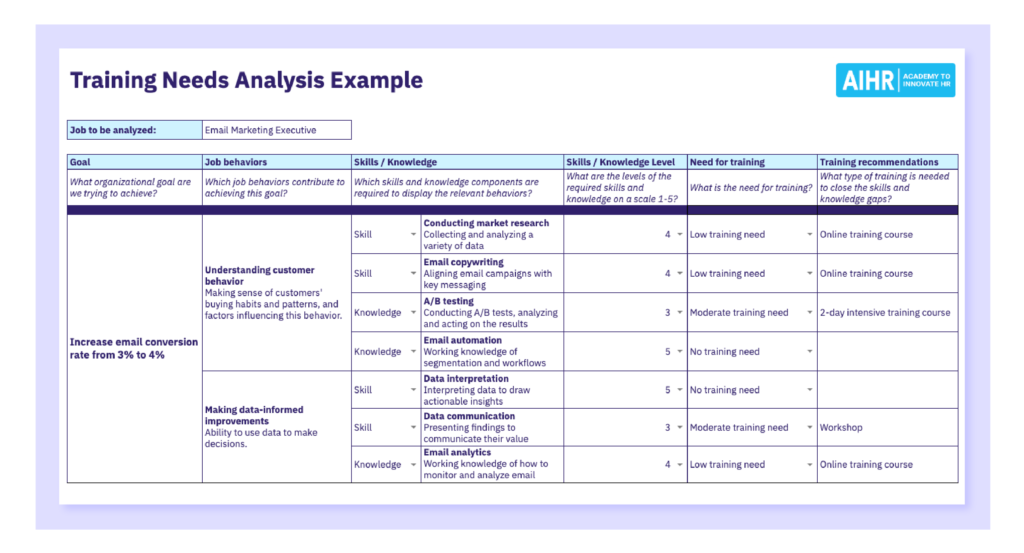
2. Organizational level training needs analysis example
Another example of a training needs analysis would be on an organizational level. Let’s consider a simple example of a training needs analysis (TNA) conducted at an organizational level for a company experiencing a decline in sales performance over the last quarter.
An analysis of sales data and employee feedback indicates that the sales team lacks advanced negotiation skills and up-to-date knowledge of the latest product features, which are critical for closing deals.
Goal:
- Increase quarterly sales performance by 15% to reverse the recent decline and improve overall revenue.
Job behaviors:
- Effective negotiation with clients to secure sales
- Accurate and persuasive presentation of product features and benefits
Skills and knowledge:
- Skills:
- Advanced negotiation techniques, including how to overcome objections and close deals
- Effective communication skills for presenting product features in a compelling way
- Knowledge:
- Up-to-date information on the latest product features and how they compare to competitors
- Understanding of customer needs and how the company’s products meet those needs
Training needs:
- The sales team requires training in advanced negotiation techniques and an in-depth product knowledge update, including competitive analysis.
Training recommendations:
- Organize a series of workshops on advanced negotiation skills led by an external expert
- Conduct product training sessions to update the team on the latest features, benefits, and competitive positioning
3. Hiring Manager example
Steve Dion, Founder & CEO of a leadership consultancy company Dion Leadership, shares a training needs analysis example from a client. The company was looking to implement interview training on their relatively new process. A training needs analysis revealed that the problem wasn’t that hiring managers didn’t know or understand the process.
“They too often “freestyled” their approach to interviews to fit their comfort level, thus missing key points the process was designed to address, which resulted in poor hires,” says Dion. “The training solution we designed covered not only the mechanics of the process, but the “whys” of each detail, the “unlearning” of old habits, and the clarification of expectations and support.”
Training needs analysis template
Get our free training needs analysis template to conduct effective analyses at your organization: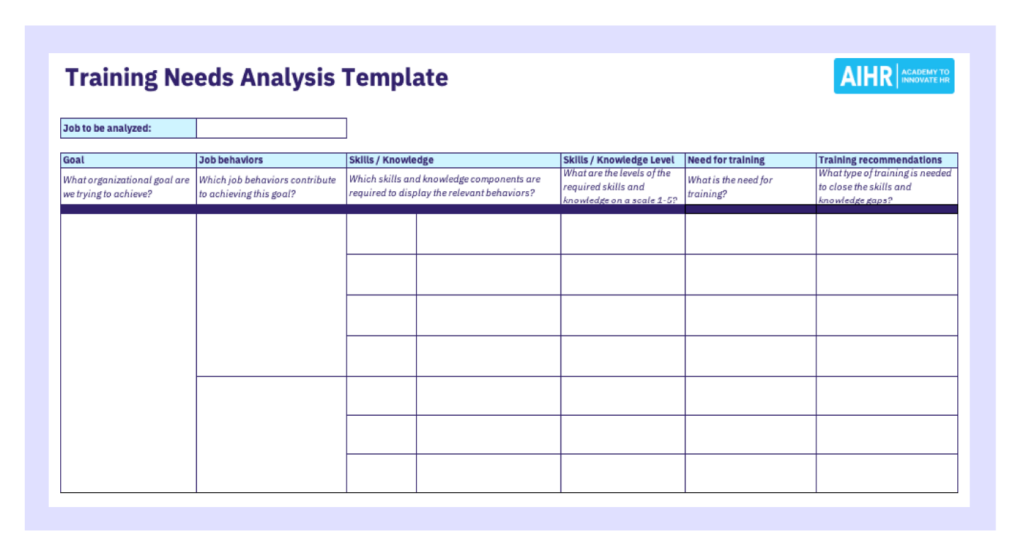
Training needs analysis questions
In each step of the training needs analysis process, you can ask specific question that will help you conduct the assessment in an effective way.
Step 1. Define organizational goals
- What problems are occurring in the organization?
- What is the organization trying to achieve?
- Which organizational goals require the biggest change in employee behaviors?
- Which departmental goals are lagging?
- Which individual performance goals should be improved?
- Can these problems be solved through different behaviors?
Step 2. Define relevant job behaviors
- Which job behaviors contribute to the goals defined in step 1?
- If the listed job behaviors are ‘fixed’, does that bring us closer to the goals defined in step 1?
- Do the listed job behaviors align with our organizational core values?
- Which cultural cues reinforce undesirable behavior?
- What other influences play a role in reinforcing undesirable behavior?
Step 3. Define the required knowledge & skills
- Which skills are required to display the behaviors we defined in step 2?
- Which knowledge components are required to display the behaviors we defined in step 2?
- Once the listed skills and knowledge components are taught, will the relevant job behaviors always be displayed?
- What is hindering the display of relevant job behaviors once the listed skills and knowledge components are taught?
Step 4. Develop training
- Is all the information required to start the training design and development process present?
- Are there non-training alternatives that we can deploy that will have a similar effect?
Over to you
Training needs analysis is vital in helping organizations determine the specific learning needs of employees so that they can be more effective and productive in their roles. It can also uncover in-demand skills that are currently lacking in the workforce.
It might be an arduous task, but without performing TNA, your training initiatives are bound to fail, and you might end up wasting company resources on irrelevant learning programs.
FAQ
Training needs analysis helps organizations idetify the gap between the actual and the desired knowledge, skills, and abilities (KSA) in a job. It can be used to develop L&D programs to train new hires, identify new projects, boost staff productivity, advance individual careers, and develop employees with leadership potential.
Training needs analysis and subsequent training can help solve organizational problems caused by a lack of knowledge, skills, or abilities. Moreover, it provides the insights and steps to ensure the success of your training programs.
Conducting a training needs analysis involves four steps:
1) Define organizational goals
2) Define relevant job behaviors
3) Define required knowledge and skills
4) Develop training
Training Needs Analysis (TNA) tools are methodologies and instruments used to identify gaps in employee skills, knowledge, and abilities within an organization. These tools, including surveys, interviews, focus groups, and performance data analysis, help in designing targeted training programs to address those gaps.
Learn more
Related articles
Are you ready for the future of HR?
Learn modern and relevant HR skills, online

